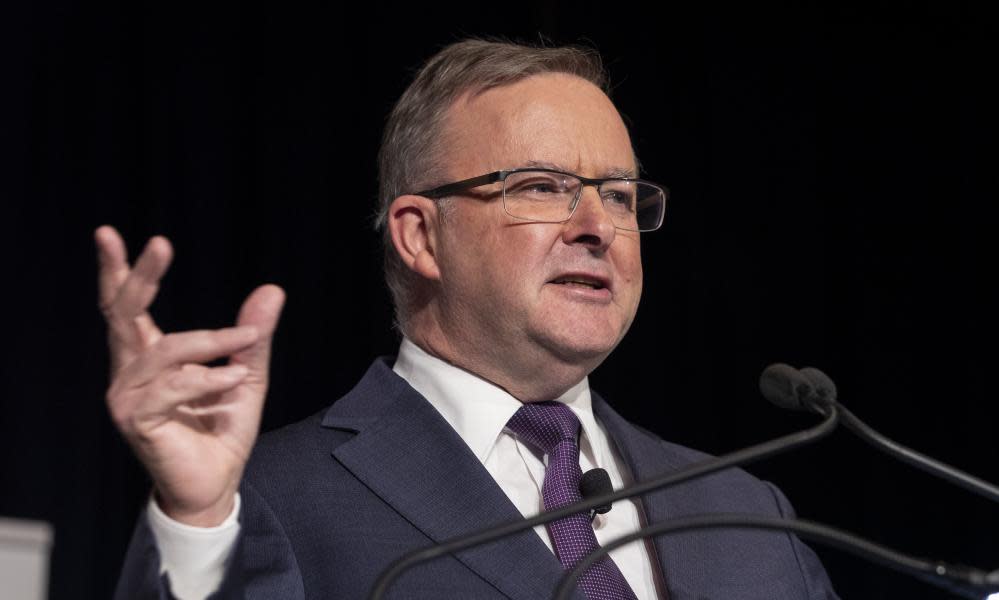Labor to announce net zero emissions target by 2050 and will oppose taxpayer funding of new coal power

Labor has locked in behind a target of net zero emissions by 2050, and will oppose taxpayer funding of new coal-fired power plants, in the party’s first major decisions about climate policy for the next federal election.
As well as adopting the clear 2050 target that Scott Morrison appears reluctant to sign up to, in part because of rolling combat within the Coalition, Guardian Australia understands shadow cabinet has also decided to oppose using carryover credits from the Kyoto period to meet future emissions reduction targets.
The Morrison government plans to use carryover credits to meet about half of Australia’s 2030 emissions reduction target, and departmental officials have confirmed they are not aware of any countries other than Australia planning to use controversial accounting methods to meet international climate commitments.
Related: Anthony Albanese backs Adani coalmine but criticises proposed Collinsville power plant
The first significant shadow cabinet decision on climate policy, expected to be flagged by Anthony Albanese in a major speech to a thinktank on Friday, comes as the opposition battles its own internal tensions about abatement targets and the future of coal.
Guardian Australia understands concerns were expressed during the shadow cabinet deliberation about the risks of setting a concrete target in the absence of a roadmap to get there. There were also concerns about how Labor would answer the inevitable questions about the cost of action.
While a majority in Labor favour action, some in the right faction believe Labor’s commitment to climate policy ambition has cost the party electorally, and Labor will not win the next election unless it reconnects with workers in coal regions in New South Wales and Queensland.
The shadow cabinet decision to be flagged on Friday holds the line on ambition from the previous term, and establishes the framework for more detailed policy development. But Labor is yet to set a medium-term emissions reduction target, and that process will trigger fresh internal contention.
While the prime minister has signalled he won’t sign up to a net zero target before he can quantify the costs of action, research by the CSIRO suggests that Australia can meet a mid-century net zero target without a major hit to the economy or to wages.
Work from the University of Melbourne also suggests the costs of not meeting the goals set out by the Paris agreement could be as high as $2.7tn to 2050.
Albanese used his first “vision statement” after taking the Labor leadership to try to square the circle between pursuing ambitious climate policy and job creation in new industries. Last October, he sought to recast Labor’s climate policy as part of a new industrial “revolution”, saying the shift to clean energy will underpin an Australian manufacturing boom that unlocks new jobs and export opportunities.
Related: Public support for new coalmines falls even among Coalition voters, ANU poll finds
“The world is decarbonising,” Albanese said. “With the right planning and vision, Australia can not only continue to be an energy exporting superpower, we can also enjoy a new manufacturing boom. This means jobs.”
The Labor leader chose Queensland this week as the location for his fourth “vision statement”. He told reporters Labor needed to improve its performance in the state given the backlash in regional seats in the federal election last year – a backlash triggered largely by the Coalition campaigning on a pro-coal platform.
“There is a range of things we need to do better in Queensland,” Albanese said on Wednesday. “Our priority is jobs and jobs here in Queensland, and we make no apologies for that”.
In Queensland, Albanese was positive about jobs generated by the Adani coal project, but he blasted the Morrison government’s decision to fund a feasibility for a new coal-fired power plant at Collinsville.
Friday’s speech from Albanese to the progressive think tank Per Capita is billed as “leadership in a new climate”.

 Yahoo News
Yahoo News 
